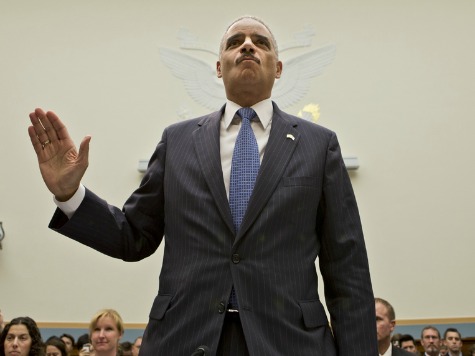
Attorney General Eric Holder may have violated federal law when he did not put his recusal from the secret Associated Press phone records seizure case in writing, Rep. Raul Labrador (R-ID) suggested during a House Judiciary Committee hearing on Wednesday.
Holder said he was not involved in the secret collection of AP phone records because he had recused himself from the investigation which led to the seizure. The Department of Justice hoped to find the source of leaked confidential information, and Holder claims he recused himself because he had access to that information and therefore was a suspect.
“[I] have heard you several times talk about ‘best practices and proprieties.'” Labrador said during his questioning of Holder. “When you decided to recuse yourself, did you look at best practices? I think you admitted already it would have been a better practice for you to put it in writing.”
Labrador then cited federal law, specifically 28 USC § 591, and noted that it requires the Attorney General to put a recusal in writing in “certain circumstances.”
“Frankly, I’ve read it a couple times, I don’t know if it applies to your situation right now, but don’t you think it would have been the best practice for you to just put it in writing especially on an issue of such significance?” Labrador asked.
Holder answered that he would consider putting recusals in writing in the future.
Federal law requires that the U.S. Attorney General sign off on the type of subpoena used in situations such as the AP investigation, but Holder claimed that when he recused himself, that responsibility fell to Deputy Attorney General James Cole. Asked directly if he put his recusal in writing, Holder said no. He claimed he only informed Cole of the decision.
The law that Labrador cited notes that when the Attorney General decides his recusal is necessary, he must put such a determination in writing. The exact text of that section of law is as follows:
“Recusal of Attorney General.–
(1) When recusal is required.–
(A) If information received under this chapter involves the Attorney General, the next most senior official in the Department of Justice who is not also recused shall perform the duties assigned under this chapter to the Attorney General.
(B) If information received under this chapter involves a person with whom the Attorney General has a personal or financial relationship, the Attorney General shall recuse himself or herself by designating the next most senior official in the Department of Justice who is not also recused to perform the duties assigned under this chapter to the Attorney General.
(2) Requirements for recusal determination.– Before personally making any other determination under this chapter with respect to information received under this chapter, the Attorney General shall determine under paragraph (1)(B) whether recusal is necessary. The Attorney General shall set forth this determination in writing, identify the facts considered by the Attorney General, and set forth the reasons for the recusal. The Attorney General shall file this determination with any notification or application submitted to the division of the court under this chapter with respect to such information. “
A Department of Justice spokeswoman has not immediately responded to Breitbart News in response to Labrador’s line of questioning.

COMMENTS
Please let us know if you're having issues with commenting.